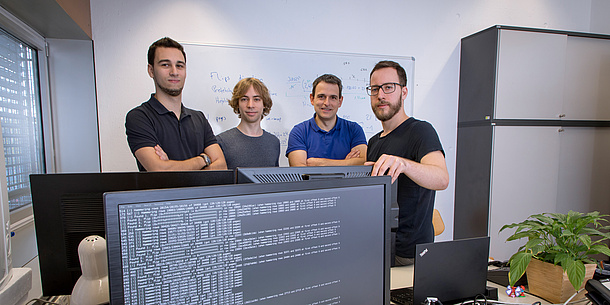
To acquire this specialist knowledge, you can complete the major in Information Security as part of the following master’s degree programmes:
- Computer Science
Do you want to make future technologies secure? Combine your major in Information Security with a minor in Machine Learning or another field of computer science. - Information and Computer Engineering
Do you want to be among those who build the newest secure processors of the future? Do you want to build secure robots or secure IoT devices? Combine your major in information security with a minor in the field of electrical engineering. - Software Engineering and Management
Are you planning to set up your own company one day? Do you aim for a management position? Combine your major in information security with a minor in the field of business and management!
Depending on the degree programme, selecting a Major in Information Security means taking courses to the extent of at least 40 to 60 ECTS credit points in this field. Each study year more than 120 ECTS are offered in Information Security at TU Graz.
Information Security in Degree Programmes
The training takes place in the four core research areas of TU Graz in the field of Information Security. The courses will lead you from the foundations to cutting-edge research and impactful applications:
- Cryptology and Privacy: You will learn about the mathematical foundations of security and the design rationale behind cryptographic schemes, get familiar with modern crypto designs and privacy-preserving computation, learn state-of-the-art cryptanalysis techniques, and understand potential future threats like quantum computers.
- System Security: You level up your skills in secure software development, digital system design and hardware security, find out how microarchitectural attacks like Spectre and Meltdown work and how to harden implementations and systems against such side-channel and fault attacks.
- Formal Methods: You will address the question of how security and bug-free functionality can be verified, tested, or even formally proven.
- Secure Applications: You learn how to apply these foundations to design solutions for real-world applications and networks. In addition, you will address questions such as how secure your digital identity is on your mobile phone and how to manage security processes in a large organisation or in the e-government.
In addition to these four core areas, you can choose from a list of courses on selected topics relevant for a broader information security perspective, such as legal aspects, information theory and coding, compilers, or embedded applications.
For questions on the content of the Major:
deansoffice.csbme@tugraz.at
Faculty of Computer Science and Biomedical Engineering
For questions about admission:
study@tugraz.at
Information Security Research

Research Areas
Research on all aspects of information security is conducted at the Institute of Applied Information Processing and Communications (IAIK). This research is carried out to find answers to the most pressing IT security challenges. This takes place in 4 research areas:
- Cryptology and Privacy: Researchers create, analyze, and optimize modern cryptographic schemes such that they can be broadly used in practice. They advance the state-of-the-art in cryptologic security and privacy.
- System Security: The goal is to analyze the security of systems and discover potential vulnerabilities before they are exploited as well as to design defenses to mitigate concrete attacks and to eliminate entire classes of vulnerabilities and bugs. This system-oriented approach is essential for secure platforms - from small embedded processors to cloud infrastructures.
- Formal Methods: Research on mathematical methods and tools is conducted in the research area Formal Methods in order to ensure that systems do not display any functional or safety errors. An important field of application are robust, transparent AI systems.
- Secure Application: The team develops innovative solutions and tools in the research area Secure Applications especially for the public sector. Developers can use these while creating secure IT applications.

Research Highlights
TU Graz performs world-leading research in information security. TU Graz faculty members bring their research into courses at master's level and offer to do master's theses and seminars based on the latest research results. Example highlights of the research include:
- New Standards in Cryptography: The US National Institute of Standards and Technology (NIST) in 2023 has selected the algorithm Ascon as standard for lightweight cryptography. Ascon has been designed at TU Graz and has been selected out of 56 submissions from all over the world in a multi-year selection process.
TU Graz researchers have also been involved in the design of SPHINCS+, which is a post-quantum cryptography algorithm that has also been selected by NIST for standardization. - Side-Channel and Transient Execution Attacks: TU Graz has been pioneering several attacks and countermeasures in the context of computer hardware. For example, the processor vulnerabilities Meltdown and Spectre in 2018 have received significant media attention worldwide.
- ERC grants: The TU Graz faculty members Daniel Gruss and Stefan Mangard have both received prestigious ERC grants. With these grants the European Research Council aims at supporting outstanding researchers to do frontier research.
Find the latest research results here




